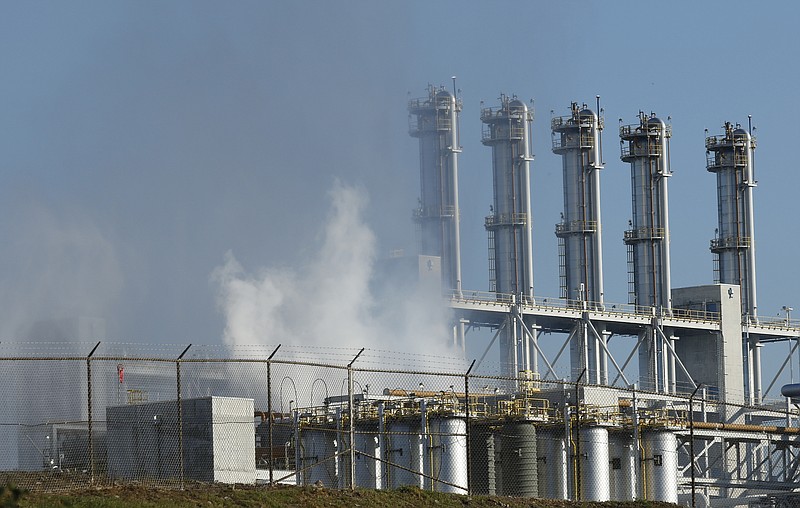The biggest manufacturing investment in Southeast Tennessee will likely remain idle until early next year after a pair of explosions in late August and early September forced the plant in Charleston, Tenn., to cease production of a key ingredient for the solar power industry.
Wacker Chemical expects to lose one-fourth of its global production of polysilicon while it assesses and repairs its Charleston plant, which was damaged in a fire and explosion Sept. 7 and a plant fire eight days earlier. But the German chemical company is continuing to maintain its 687-employee staff in Charleston, reassigning and training workers while plant repairs are made and an ongoing $150 million expansion of the facility continues.
"Restarting production will take several months," said Mary Beth Hudson, vice president and site manager for the $2.5 billion plant where Wacker began production last year. "We will take our time and cover all the necessary steps before the production process restarts."
An Aug. 30 plant fire injured five plant workers, and the Sept. 7 explosion caused neighboring residents and schools to take shelter until officials were able to assess the risk of any chemical releases from the accident. Ultimately, Wacker and state and local officials said the chemical releases were within allowable levels and the leaking chemicals were removed from the plant last month.
But the incident remains under investigation by the Tennessee Occupational and Safety Administration.
Kim Schofinski, deputy communications director for the Tennessee Department of Environment and Conservation, said Monday that water samples from the Hiwassee River downstream of the Wacker plant following the accident were comparable to previous sampling at the same location.
"Our Air Pollution Control investigation is ongoing," Schofinski said.
Hudson said the physical damage to the building was not as significant as initially thought and the building has been stabilized.
"This removal process was meticulous and efficient," she said. "Safety was and continues to be our top priority and focus."
Shawn Fairbanks, director of Bradley County Fire & Rescue, said his office has met several times with Wacker over the past seven weeks to develop a better method of notification and radio communication about chemical releases and accidents.
Wacker has more than 200 air monitors on the sprawling chemical plant site built in northern Bradley County. But Fairbanks is urging Bradley County to install air monitoring equipment at both Walker Valley High School, located about a half mile from Wacker, and Charleston Elementary School, located about three-quarters of a mile from the plant.
"We would like to know specifically at Charleston and Walker Valley what the air quality is, and maybe toward the interstate and a few other areas," Fairbanks said.
Installing the extra air monitors is estimated to cost about $37,000, Fairbanks said.
The chemical plant explosions are far more costly for Wacker, which has hired a third party to assess the explosions and to recommend corrective actions. Although production has been halted at the plant for more than seven weeks already and could be idled for months longer, Wacker spokeswoman Lisa Mantooth said Wacker has not laid off any workers and is using the production outage to train workers and perform other work and repairs at the facility.
"All of our employees remain on staff and are continuing to get their paychecks," she said. "Some are going through training and others are assisting in repairs and other plant work."
Mantooth said Wacker won't do any more production in Charleston until the investigation of the incidents is completed and any corrective actions required are completed.
Despite the costly setback at its Tennessee facility, Wacker said last week its third quarter sales were up 35 percent over a year ago and the company raised its forecasts for operating earnings for the balance of the year.
"At Wacker, the third quarter was the most successful so far this year," Group CEO Rudolf Staudigl said last week at the company's headquarters in Munich, Germany. "Demand for silicone and polysilicon was especially strong, with the two divisions posting new volume records. Our robust performance more than compensated for the headwinds from markedly higher raw material prices and a stronger euro. Given the continued strength of our business, we are upgrading our forecast."
Wacker expects its earnings before income taxes, depreciation and amortization to total 1 billion euros.
Hudson said she is confident "Wacker-Charleston will become stronger and better" to better meet the growing demand for polysilicon as demand for solar panels continues to grow. In a statement, Hudson thanked both Wacker staff and the local community for their comments and suggestions following the recent accidents.
"This feedback has been helpful as we strive long-term to be among the best corporate citizens for our community and for our state," she said.
Contact Dave Flessner at dflessner@timesfreepress.com or at 757-6340.
